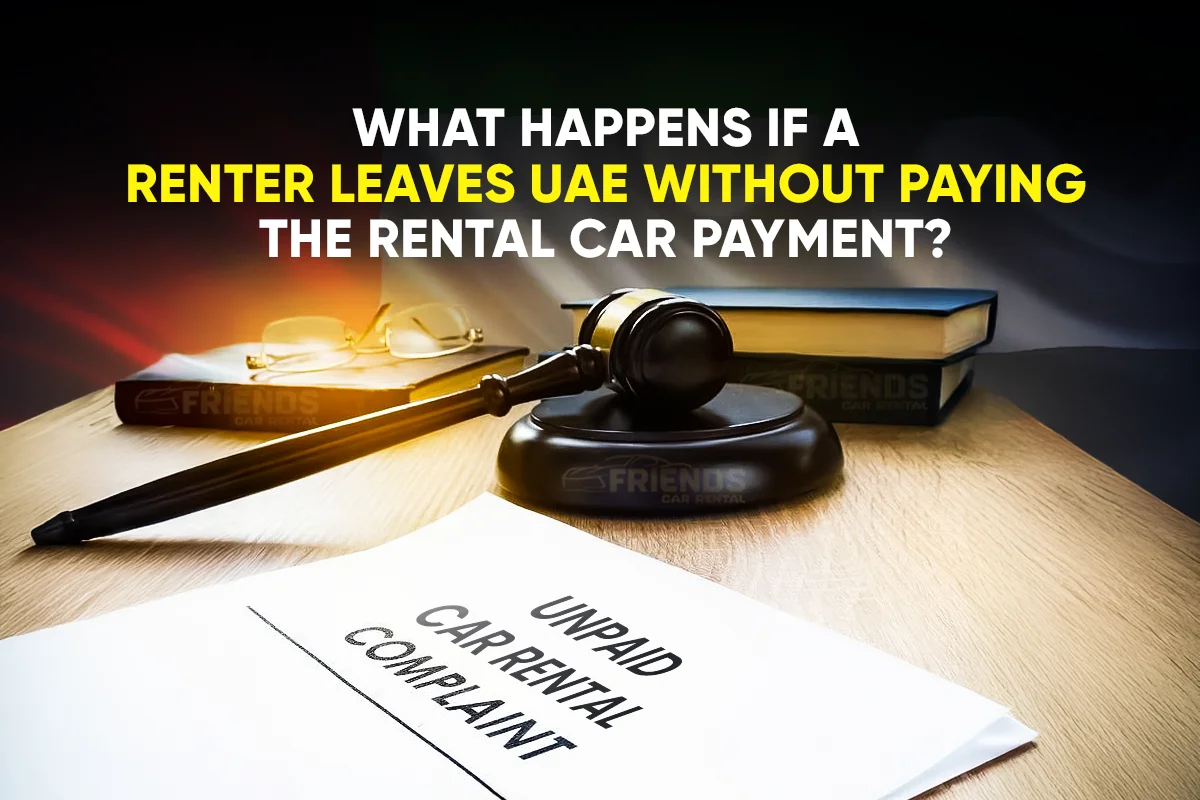What Happens If You Leave UAE Without Paying Your Rental Car Payment?

Skipping your UAE rental car payment might not seem a big
deal at a glance. It’s an illusion—don’t fall for it. Leaving UAE without
settling your dues can lead to serious consequences—from future UAE travel bans
to potential arrests. If you ever are in such a situation, don’t flee. There is
always a way out—you just need to know where to look. This article breaks down
the governing rules and risks (immediate and future) of unpaid rental car UAE.
It also offers you practical tips and prevention methods. Stick to the end and
learn to navigate around UAE rental car laws.
Let’s get started:
Understanding the Risks of Unpaid Rental Car Debts
The UAE rental car non-payment isn’t just about money—it
extends to unimaginable disruptions. It can haunt you beyond your trip. From
legal UAE debt collection cases to travel ban debt—it can hit your finances and
future travel—hard. Here’s what the rental car debt UAE consequences look like
(both for tourists and residents).
How Rental Companies Respond to Non-Payment
Rental companies will trigger a series of legal actions
against you for unsettled payments. Since they have your personal and contact
details (taken during rental), they’ll bombard you with emails and phone calls.
If you had used a credit card for initial payment, they would try charging it.
They have contractual rights to do so.
If no avail, they will file a police complaint. This is
serious and you will bear the consequences. With the help of UAE debt
collection firms, agencies can pursue you overseas too. If you manage to dodge
them, they will blacklist you from renting cars in the UAE.
Potential for a Travel Ban
But the more serious consequence is the UAE travel ban.
With an existing police case against you, you will surely face UAE immigration
issues. The Emirates government will ban you from re-entering the country,
potentially derailing your travel routes and plans. The severity of the travel
ban is entirely up to the authorities, more than rental companies.
Not all formal complaints escalate to travel ban—but
threats are possible. The higher the amount, the longer the ignored debt—more
serious are the consequences.
Rules Governing Car Rentals in the UAE
The UAE car rental laws clearly bind both parties:
renters and rental agencies. Rental contracts and agreements outline the
obligations for the renter. Every renter should put a pen to the paper binding
them to every rule scripted. Renters’ obligation is to make a complete payment
while returning the car. Payments via cash, bank transfers, or digital wallets
are possible.
Car rental debts automatically tie with renter’s
passports (tourists) or Emirates IDs (residents). As all vehicle rentals link
with Dubai RTA, the renter-vehicle association is legal and official. No renter
can deny it. Therefore, making them liable for all rental-related payments like
Salik (tolls), parking fees, late return fees,
traffic fines, and so on. On the rental agencies’ side, they must follow UAE
consumer laws, ensuring complete transparency in fees and agreements.
Unsettled rental debt disputes fall under civil law.
These laws apply to every renter—both short-term and long-term—tourist or
resident. Familiarizing yourself with the rental terms and agreements will help
you navigate UAE car rentals without surprises. Meet your obligations and stay
clear of troubles.
Rental Debt Issues in Dubai and Abu Dhabi
Dubai’s ever growing tourism industry brings ups and
downs in its vehicle rental industry. The ever buzzing rental industry relies
on well-structured information to settle the rental-related issues, like unpaid
car rental debt. Dubai RTA’s seamless platform for rental companies combined
with agencies’ enhanced monitoring systems, flags every payment-related detail.
This simplifies quick recoveries and filing reports against anyone trying to
finesse the Dubai car rental issues.
Abu Dhabi rental debt cases also follow similar steps,
leaning on government systems to track and report unpaid rental debts. Both the
emirates operate under the similar UAE car rental laws. However, Abu Dhabi’s
rules can be even more restricting than that of Dubai. The consequences for not
paying rental fees might also come with greater impact in Abu Dhabi. Prepare
yourself accordingly—Dubai’s high speed or Abu Dhabi’s strict
approach—unsettled rental debts never go unnoticed.
What to Do If You Can’t Pay Before Leaving
There may arise situations where you might not be able to
pay rent in full. For instance, you got into an accident and damaged the car,
and don’t have insurance to cover. Rental companies will charge you for damage
repairs and booking loss on top of your rental fees. Here are some steps you
can take to avoid UAE rental car debt escalation:
- Reach out to your rental agency in advance. Call them to
discuss your situation. In person discussion is even better. Explain to them
your situation honestly and clearly. Communication is key.
- Inquire about potential alternative payment methods or
arrangements. Request for payment in installments or over time. They might come
up with a suitable solution to your problem. Using a guarantor (if available)
can help.
- If you reach an agreement, get everything in writing.
Ensure it is documented in ink (email also works). Authorized company
representative acknowledgement and signature on the agreement is recommended.
- Seek legal assistance if necessary. Things might not go
as planned, so a legal representative can help you navigate through the
situation. However, a solution is not always guaranteed.
- Your countries’ embassy or consulate can be your final
resort, if you are left with no options. They might not be able to help you
directly. But they can guide you with local laws and connect you with legal
resources.
Preventing Rental Payment Problems
It’s better to be safe than sorry. With some careful
assessment and planning, you can flawlessly prevent UAE rental car payment. These
proactive steps can guide you through a stress-free rental experience:
- Research and pick rental agencies that are transparent
with their service and charges. Transparency goes a long way. Choosing the
right agency will help you avoid disputes regarding rental payment.
- Read the rental agreement thoroughly before signing it.
Know what you are signing up for. Consider even the tiniest details, from
hidden fees to extra charges. Make everything clear—ask the agents to clarify
wherever needed.
- Consider your
budget well before renting a car in the UAE. Choose cars that match your pocket
size. Make sure you can cover expenses without any difficulty. Don’t forget to
consider extra expenses that may occur during your rental period.
- Clarify what payment methods the rental agency accepts.
Credit cards, debit cards, cryptocurrencies, bank transfers, digital wallets,
and so on. Also understand if they hold security-deposits and release periods.
- Choose insurance like collision damage waiver or similar
to safeguard yourself from potential accidents and car damages. Different insurance policies for rental
cars are available in the UAE.
- Inspect the vehicle in detail before hitting the road.
Document damages so that agencies don’t rip you off for existing damages. Take
steps to reduce extra payments, such as traffic fines and late returns.
- Some rental companies may offer discounts on full upfront
payment. Take advantage of such offers to save some extra money.
Final Thoughts
Understand the risks of unpaid car rental debts well
before you act—flee the country. They come with serious consequences, which
sometimes can involve cross-border UAE debt collection firms and even legal
complaints, potentially derailing your future travel plans. It’s not wise to
finesse a rental company as you’re now armed with insights on rules, regional
quirks, and smart steps to steer clear of tourist debt UAE or expat debt UAE
through effective communication. More importantly, with proper planning and the
advice above, you can easily avoid rental payment problems and enjoy the UAE’s
roads with confidence. Therefore, always ensure your rental obligations are met
before departing the UAE to avoid these serious repercussions and secure a
smooth ride.
Written by: Friends Car
Published at: Sun, Apr 13, 2025 6:43 PM
Leave a Reply
Your email address will not be published. Required fields are marked *
Car Rental in Dubai
AED 2500
DAY
AED 0
MONTH
-
 SUV
SUV -
 4 Doors
4 Doors -
 5 Seats
5 Seats
- 1 Day Rental Available
- Deposit: Not Required
- Insurance Included
AED 5500
DAY
AED 0
MONTH
-
 Sports
Sports -
 2 Doors
2 Doors -
 2 Seats
2 Seats
- 1 Day Rental Available
- Deposit: Not Required
- Insurance Included
AED 1200
DAY
AED 0
MONTH
-
 SUV
SUV -
 4 Doors
4 Doors -
 5 Seats
5 Seats
- 1 Day Rental Available
- Deposit: Not Required
- Insurance Included
AED 1600
DAY
AED 0
MONTH
-
 SUV
SUV -
 4 Doors
4 Doors -
 5 Seats
5 Seats
- 1 Day Rental Available
- Deposit: Not Required
- Insurance Included
AED 1500
DAY
AED 28500
MONTH
-
 SUV
SUV -
 4 Doors
4 Doors -
 5 Seats
5 Seats
- 1 Day Rental Available
- Deposit: Not Required
- Insurance Included

 عربي
عربي
 English
English
 Français
Français
 Русский
Русский
 中国人
中国人
 Nederlands
Nederlands
 Española
Española
 Türkçe
Türkçe
 Italiana
Italiana














































